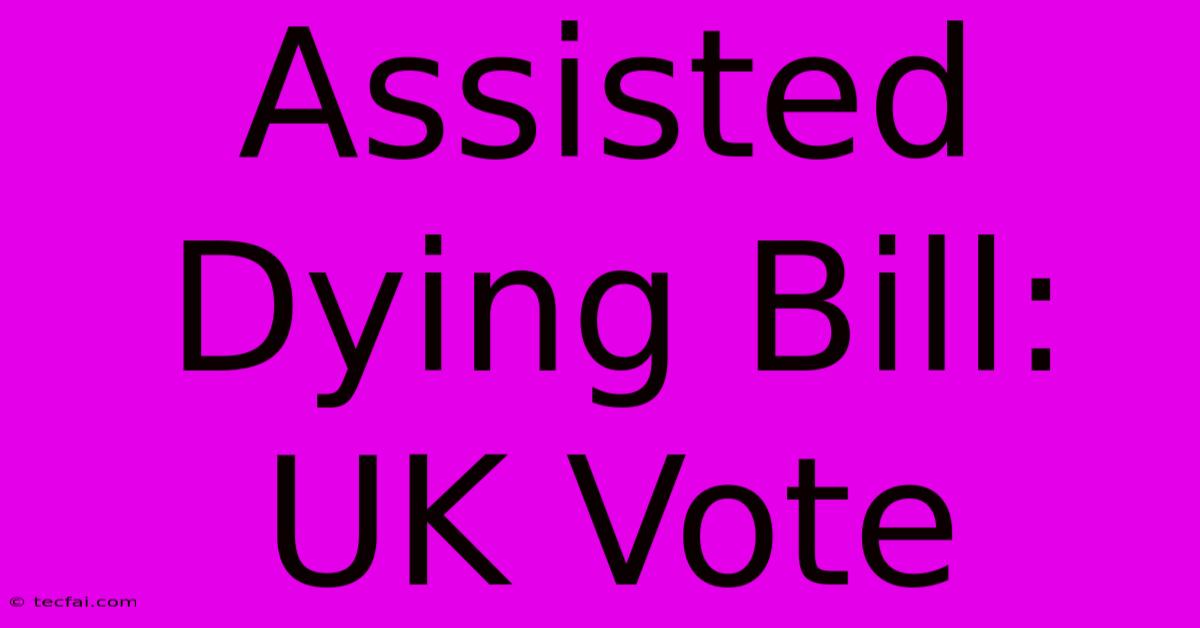Assisted Dying Bill: UK Vote

Discover more detailed and exciting information on our website. Click the link below to start your adventure: Visit Best Website tecfai.com. Don't miss out!
Table of Contents
Assisted Dying Bill: UK Vote – A Nation Divided
The UK's ongoing debate surrounding assisted dying is a complex and deeply emotional issue, sparking passionate arguments on both sides. Recent calls for a new Assisted Dying Bill and the subsequent parliamentary discussions have once again brought this sensitive topic to the forefront of national conversation. This article explores the key arguments, the potential implications of a new bill, and the challenges facing lawmakers as they navigate this ethically charged landscape.
The Current Legal Landscape
Currently, assisted dying is illegal in the UK. While the Suicide Act 1961 decriminalised suicide, assisting someone to die remains a criminal offence, punishable by up to 14 years imprisonment. This stance reflects a long-held societal belief in the sanctity of life and concerns about potential abuse and coercion of vulnerable individuals.
However, the law does not address the suffering experienced by individuals with terminal illnesses who wish to end their lives on their own terms. This leaves many feeling abandoned and facing prolonged, unbearable pain.
Arguments for an Assisted Dying Bill
Proponents of assisted dying legislation argue for the right to autonomy and self-determination. They believe that competent adults with terminal illnesses, facing unbearable suffering, should have the choice to end their lives with dignity and control. Key arguments include:
- Compassion and Dignity: Allowing assisted dying offers a compassionate approach for individuals facing excruciating pain and suffering, allowing them to maintain control and dignity in their final moments.
- Individual Liberty: The right to make choices about one's own life and body is a fundamental tenet of personal liberty. Denying this right to terminally ill individuals infringes on their autonomy.
- Relief from Suffering: For individuals experiencing intractable suffering, assisted dying offers a route to relief that may not be possible through palliative care alone. It is crucial to acknowledge that palliative care, while vital, cannot always alleviate all suffering.
- Prevention of prolonged suffering for family and loved ones: Witnessing a loved one's prolonged suffering can be immensely distressing for families. Assisted dying could offer a path to a more peaceful end and allow families to grieve without the added burden of prolonged pain.
Arguments Against an Assisted Dying Bill
Opponents of assisted dying raise several crucial concerns, primarily focusing on the potential for abuse and the sanctity of life. Their main arguments revolve around:
- Slippery Slope Concerns: Opponents fear that legalising assisted dying, even with strict safeguards, could lead to a gradual expansion of the criteria, potentially endangering vulnerable individuals. The fear is that the safeguards may not be sufficient to prevent abuse.
- Vulnerable Populations: There are concerns that vulnerable individuals, such as the elderly or those with disabilities, could be pressured or coerced into choosing assisted dying, even if they don't truly desire it.
- Role of Palliative Care: Opponents emphasize the importance of improving access to high-quality palliative care, arguing that this should be the primary focus, rather than legalizing assisted dying. They believe sufficient palliative care can address many concerns related to end-of-life suffering.
- Sanctity of Life: Many believe that human life is inherently valuable and should be protected at all costs, regardless of the individual's suffering. Legalising assisted dying is viewed as a violation of this fundamental principle.
The Way Forward: Navigating a Complex Debate
The debate surrounding an Assisted Dying Bill in the UK is far from over. Finding a balance between respecting individual autonomy and safeguarding vulnerable populations requires careful consideration and robust safeguards. Any future legislation would need to address the following:
- Strict Eligibility Criteria: Clearly defined criteria for eligibility, including stringent assessments of mental capacity and terminal illness prognosis, are crucial to prevent abuse.
- Independent Medical Assessment: Multiple independent medical assessments would be necessary to ensure the individual's decision is informed and voluntary.
- Robust Safeguards and Oversight: A robust regulatory framework is essential to oversee the process and ensure accountability.
- Access to Palliative Care: Improvements to palliative care services are vital to ensure that all individuals have access to comprehensive support, regardless of their decision regarding assisted dying.
The UK's Assisted Dying Bill debate highlights a fundamental societal conflict between the right to self-determination and the protection of life. Finding a solution that addresses both concerns requires careful consideration, open dialogue, and a deep understanding of the complex ethical and practical implications involved. The future of this debate remains uncertain, but it undoubtedly necessitates a nuanced and compassionate approach.

Thank you for visiting our website wich cover about Assisted Dying Bill: UK Vote. We hope the information provided has been useful to you. Feel free to contact us if you have any questions or need further assistance. See you next time and dont miss to bookmark.
Featured Posts
-
Panalo Ng Meralco Kontra Phoenix Sa Pba
Nov 30, 2024
-
Alexander Joins Detroit Lions
Nov 30, 2024
-
Boise State Vs Oregon State Odds 2024
Nov 30, 2024
-
Ehlers Out Lower Body Injury Vs Knights
Nov 30, 2024
-
Ikky Releases I Like You Tribute Song
Nov 30, 2024
